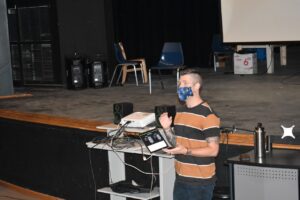
Students sit socially distanced in the University Auditorium while they watch the movie Black Panther, Sept. 17, 2020. Photo by Madelyn Ricket.
It’s Friday morning in the middle of September and around 40 students in the Film and Television Program at Western Carolina University are watching the movie “Black Panther” on the big screen in the University Auditorium. With enough social distancing, they are among the rare people this fall to enjoy big screen movies and get a class credit for having fun while learning.
“Black Panther” is known to be a film that helped shape black America. Taking place in the fictional, technologically advanced African country, Wakanda, viewers are able to see a whole new black experience and black people are able to see themselves saving the day.
Most of the students had seen this film before, but were able to see it in a new light after seeing some of the other films in this class. Blockbuster films like “Get Out”, “Moonlight”, “13th”, and “Dear White People” were shown to the students to give them a better understanding of racism in the world around them and why black creators deserve recognition.
Before the screening, professor Josh Overbay, discussed with the class the impact this film had on the industry, how Chadwick Boseman (the actor who played T’Challa in the film) and the director, Ryan Coogler, influenced the film. Afterwards, Overbay played some question and answer videos from Boseman and Coogler.

FTP Professor Josh Overbay starting the class with statistics and information about Black Panther on Sept. 17, 2020. Photo by Madelyn Ricket.
Overbay is teaching Film Practicum, a class where the professor rotates every semester and different types of films are highlighted. This semester he is trying to change how his students not only view filmmaking, but how they view each other by choosing films that force students to reconcile with their own biases.
“[Minority filmmakers] can tell different stories than me,” said Jared Draney, a white FTP student in the class. “Someone else was able to show me how they experience life.”
Every week, Overbay plays a movie that is meant to inform students on the experiences of others, especially black Americans. As the semester goes on, he will transition into showing films made by LGBTQ+ people and women.
“We never really had the opportunity to see some of these films because they’re not really advertised as something we should watch,” said Lauren Scruton, another film student in the class.
Overbay took this semester as an opportunity to expose his students to films that he never got to learn from as a film student. He mentions this because, “When we talk about the canon of film, it’s almost all white men,” said Overbay.
This means that the majority of films that are produced and critically acclaimed in this country are from white, straight, males. White producers, directors, screenwriters, The Academy, and actors. The industry, from the top down, is made to benefit that particular perspective.
According to the Hollywood diversity report, in 2017, people of color claimed only a 12.6% share of directors, and in 41% of TV shows made in the 2016-2017 year, only 11% of those episodes were directed by people of color.
“As a white male, what can I do? How can I move things in a better direction and use the privilege and platform that I have to be anti racist?” Overbay asked himself as a way to develop the class and decide on the movies. He said racism starts in the film industry just as much as it does anywhere else.
Dean George Brown sent the School of Stage and Screen an email before the semester started about how all of the professors need to include more artists of color in their curriculum. Overbay said that was the final confirmation he needed to set this course into motion.
“The arts are often the catalyst for change,” said Overbay. “I know I’m not an expert in dealing with internalized racism, I’m just on a journey.”
Overbay also had his students sign up for Anti-Racism Daily, an email newsletter that gives its subscribers daily emails that give an overview of current events and how they connect to racism and anti-racism. Every week students write a reflection to deconstruct what they read and turn it in.
Western Carolina had recently experienced racism on its campus earlier this fall. Two videos circulated of students saying racial slurs.
A protest followed of students demanding that the responsible parties get expelled, that the university develops policies to meet racist behavior with proper consequences, and that the student body gets informed of those consequences.
Once the students were expelled, Imani Hargett, an FTP student of color, said that the way WCU handled the videos “felt like a win” and said other universities most likely would not have handled it this way.
These videos were circulating when the FTP students watched “Dear White People”, a satirical film on what it is like to be a black student in a predominantly white university, and it shows the many issues black students face.
Hargett described this movie as an important eye opener for white students.
“The biggest takeaway for me was seeing other experiences that are way different than my own that I hadn’t even heard about before,” said Jasmine Hodgson, a white film student. “It really opened my eyes to how other people experience life and how racism affects them.”
Hargett spoke about how she has noticed students now speak with less ignorance since the start of the class.
“It makes it easier to talk to people because you’re seeing how people are more open minded, and they’re just like ‘Oh, wow, I didn’t know this before’. It changes people who were just not very informed before,” said Hargett.
Hargett also mentioned Overbay creates an environment where students have to put themselves into others’ shoes.
FTP student of color Niko Gonzalez said it best: “When someone puts a story on screen, they’re telling you this is a story worth telling, it deems it important. The best kind of art is a reflection of the world.”


